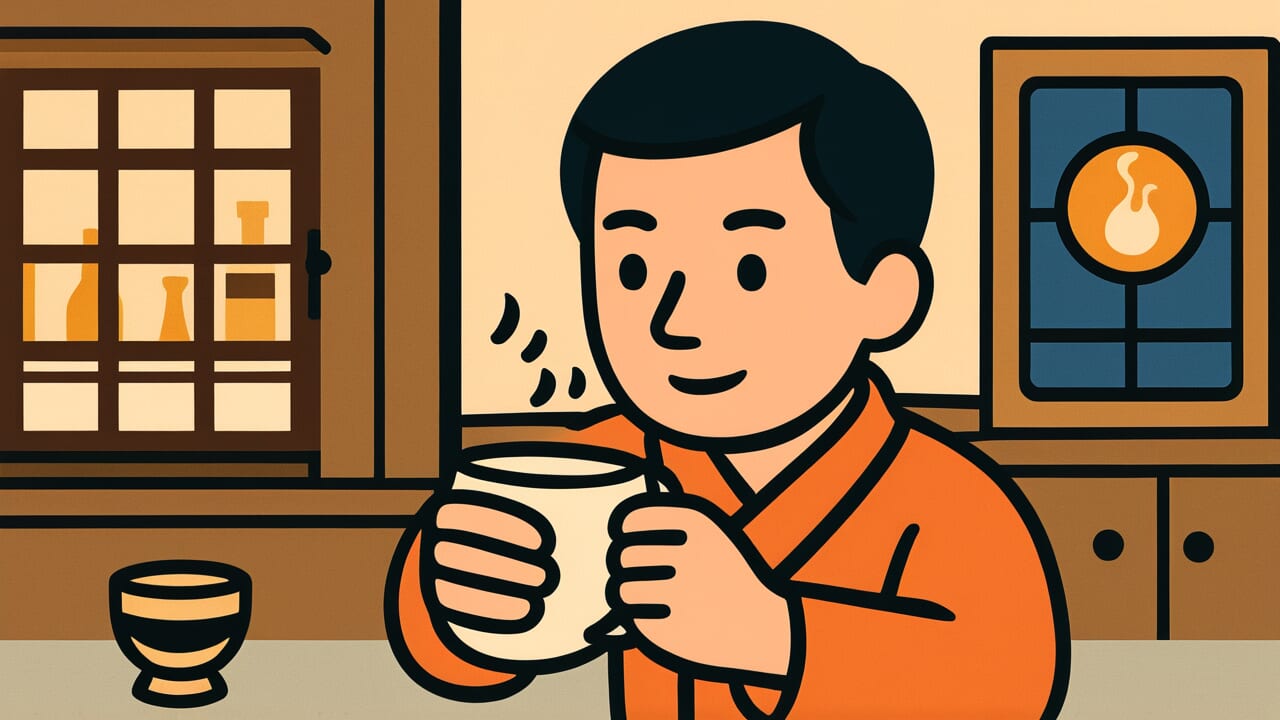How to Read “Drink sake, but don’t let sake drink you”
Sake wa nomu tomo nomaruru na
Meaning of “Drink sake, but don’t let sake drink you”
This proverb teaches that drinking alcohol is fine, but you should never lose your reason by letting alcohol control you.
In other words, you should maintain your position as the one controlling the drink, not become someone who loses self-control by being dominated by it.
People use this saying when warning themselves or friends before drinking parties, or as a lesson for someone who made mistakes because of alcohol.
The proverb doesn’t reject drinking itself. Instead, it warns against drinking too much, losing judgment, and doing things you normally wouldn’t do.
Today, we understand it as wisdom to prevent alcohol-related mistakes, embarrassing behavior, health problems, and relationship troubles.
It represents adult moderation: controlling your own intake and avoiding drinking in ways you’ll regret the next day.
Origin and Etymology
The exact origin of this proverb isn’t clearly documented in historical texts. However, we can make interesting observations from its structure.
The key is the contrast between “nomu” (to drink) and “nomaruru” (to be drunk).
“Nomu” represents the active act of drinking by your own will. “Nomaruru” is an old passive form meaning “to be made to drink.”
Here, it expresses a state of “being controlled by alcohol” or “surrendering to alcohol’s power.”
This contrast likely spread among common people during the Edo period.
Back then, alcohol was a pleasure that eased the fatigue of labor. At the same time, many people ruined themselves through excessive drinking.
Witnessing this reality, people probably created this warning about how to handle alcohol.
The concessive expression “tomo” (even though) is cleverly used. It doesn’t reject drinking itself but rather acknowledges enjoying it.
Yet it teaches that you must never lose control. This delicate balance represents Japanese wisdom about drinking culture.
Usage Examples
- Tonight’s the welcome party, but I’ll remember “Drink sake, but don’t let sake drink you” and keep it moderate
- He was late again with a hangover. Doesn’t he know the saying “Drink sake, but don’t let sake drink you”?
Universal Wisdom
Behind this proverb lies a universal truth about human weakness in self-control.
Throughout history and across cultures, alcohol has brought people joy. But at the same time, its pleasure blurs the boundaries of reason and distances people from their true selves.
What’s interesting is that this proverb doesn’t completely reject alcohol.
It says “don’t let it drink you,” not “don’t drink.” This teaches wisdom about managing desires skillfully, not suppressing them forcefully.
It’s not about total abstinence. It acknowledges moderate enjoyment while warning against giving up control.
Humans are creatures who want to surrender to pleasure. The desire to escape daily pressures never changes across time.
But if you drown in that sense of liberation, you end up hurting yourself. Our ancestors understood the importance of this delicate balance.
Enjoy yourself while maintaining boundaries. This wisdom is the art of living that humanity has learned through long history.
When AI Hears This
From a control engineering perspective, this proverb describes a fatal collapse process in control systems.
Normally, the act of drinking operates through “feedback control.” You sense your level of intoxication and use that information to decide whether to have another drink or stop.
This循環 functions properly in normal states.
But alcohol has a troublesome characteristic. As blood alcohol concentration rises, the prefrontal cortex that governs judgment deteriorates.
In other words, the sensor part of the control system itself becomes paralyzed. Research shows that judgment decreases by about 30 percent at a blood concentration of 0.08 percent.
This corresponds to “sensor failure” in control engineering.
What happens then? Feedback information can’t be obtained correctly, so the control loop stops functioning.
Humans can no longer accurately grasp their own state and fall into an “open-loop state” without brakes.
At this point, only the input of alcohol amount continues to increase unilaterally, and the system runs wild.
The human who was the controller becomes dominated by the external input called alcohol. The phase transition to the state of “being drunk” is complete.
The terrifying aspect of this proverb is that it points out the most dangerous engineering paradox: a control system taking in a substance that destroys its own control ability.
Lessons for Today
What this proverb teaches modern you is the importance of maintaining control in every aspect of life.
Not just alcohol, but smartphones, games, social media, work, and relationships—things that captivate us are everywhere.
Enjoying them is wonderful, but haven’t you unknowingly become the controlled side?
What matters is not losing your center while enjoying yourself.
Staying up late staring at your phone, taking on too much work because you can’t say no—everyone has these experiences. But that’s the state of “being drunk.”
You have the power to choose. Distinguish between enjoying and drowning, and keep steering your own life.
You don’t need to be perfect. Sometimes you’ll let loose. But you can regain yourself the next day.
If you keep this wisdom in your heart, you can remain the protagonist of your own life.



Comments